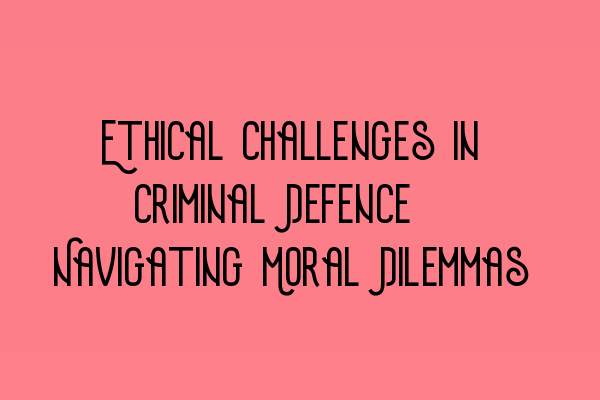Ethical Challenges in Criminal Defence: Navigating Moral Dilemmas
As criminal defence solicitors, we are often faced with numerous ethical challenges. Our primary responsibility is to provide the best possible legal representation for our clients while adhering to the ethical standards set forth by the legal profession. In this blog post, we will explore some common ethical dilemmas we encounter in our practice and discuss how to navigate through them in a manner that upholds our professional integrity.
Confidentiality and Attorney-Client Privilege
One of the fundamental pillars of our work as criminal defence lawyers is maintaining confidentiality and attorney-client privilege. Our clients trust us with sensitive and often incriminating information, and it is our duty to protect that trust. This ethical duty can present challenges when balancing our obligations to clients with our responsibilities to the court and society.
However, it is essential to remember that our duty of confidentiality extends only to legal communication. In situations where there is a risk of harm to others or a legal obligation to disclose information, we must carefully consider the ethical implications and seek guidance from relevant laws and regulations.
Zealous Advocacy vs. Truthfulness
Another ethical challenge in criminal defence revolves around the tension between zealous advocacy and truthfulness. As lawyers, our duty is to vigorously represent our clients’ interests and present the most compelling case possible. However, this does not mean we can disregard the truth or mislead the court.
We must strive to maintain professional integrity by diligently investigating facts, presenting credible evidence, and conducting ourselves ethically during cross-examination. While our duty lies in advocating for our clients, we must always do so within the confines of ethical boundaries.
Conflicts of Interest
Conflicts of interest can arise in criminal defence when we have a personal, professional, or financial interest that may compromise our ability to provide unbiased representation. Identifying and addressing potential conflicts of interest is crucial to maintaining our professional integrity and ensuring fair and impartial outcomes.
In such cases, we must promptly disclose any conflicts to our clients and, if necessary, seek proper consent or withdraw from representation. Ethical decision-making plays a vital role in safeguarding the interests of both our clients and the criminal justice system as a whole.
Conclusion
As criminal defence solicitors, our duty to navigate ethical challenges is an ongoing responsibility. By upholding the principles of confidentiality, professionalism, and integrity, we can effectively advocate for our clients’ rights while maintaining the public’s trust in the legal profession.
For more information on SQE criminal law and practice, check out our related articles:
- SQE 1 Practice Exam Questions
- SQE 1 Practice Mocks FLK1 FLK2
- SQE 2 Preparation Courses
- SQE 1 Preparation Courses
- SRA SQE Exam Dates
